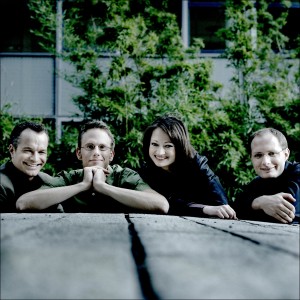CHAMBER MUSIC SOCIETY OF SALT LAKE CITY, Fauré Piano Quartet, Libby Gardner Concert Hall, University of Utah, Feb. 19
Germany’s Fauré Piano Quartet is one of today’s most exciting chamber music ensembles. One of the few full time piano quartets they have been exploring this interesting repertoire for nearly two decades, and they’ve done so with a keen sense of interpretation and great musicality.
The group was in Salt Lake City Wednesday playing a wonderful program that featured two works that don’t receive the due they deserve: Frank Bridge’s Phantasy in F sharp minor and Richard Strauss’ Piano Quartet in C minor, op. 13.
They opened with the Bridge piece. Bridge is today best remembered as the first teacher of Benjamin Britten, but he was also a significant composer in his own right. The Phantasy is a superb piece that blends a healthy dose of lush romanticism with occasional modern idioms. It’s predominantly conservative but it does manage to move in a different direction than the music of Bridge’s older contemporary, Edward Elgar.
The Fauré gave an effusive account of the work that underscored the rich expressiveness of the music. They brought out the finely shaded expressions and vibrant romanticism with their nuanced playing and certainly made the work their own.
The same held true for the Strauss quartet, an early work that owes much to Johannes Brahms. Growing up with a musician father who revered Brahms and reviled Richard Wagner, it’s no wonder the young Strauss’ early works are indebted to the much older composer, although the discerning ear can pick up a few things that foreshadow what is to come.
Subtle hints of what an older Strauss was to do were apparent in the quartet, written when the composer was around 21. Intoxicatingly lush, the quartet is a glorious piece that certainly deserves more performances. The Fauré played it as if it had been written for them. They played with sweeping lines, broad gestures and bold strokes that did justice to the music. They infused their playing with lyricism and finely crafted expressions; their interpretation was sincere and heartfelt.
Rounding out the program was W.A. Mozart’s Piano Quartet in E flat major, K. 493, the second of two piano quartets he wrote. The foursome gave a scintillating account of the work, imbuing it with a romantic fervor that worked quite well. This is a piece written on a grand scale and on the same level as his mature string quartets and string quintets. The Fauré’s interpretation easily captured the sophistication of the music. It was a forceful reading that had depth and definition and articulated the work’s lyricism and expressiveness wonderfully.

